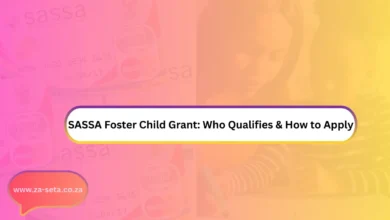Can I Receive My Parent’s SASSA Grant Payment on Their Behalf?

Find out if you can receive a SASSA grant payment on behalf of your elderly parent. Learn about Power of Attorney, proxy requirements.
Understanding the Role: What Does It Mean to Receive a Grant on Behalf?
Sometimes, an elderly parent can’t collect their SASSA grant—because of age, illness, or mobility issues. The good news is SASSA allows a proxy (also called a procurator) to collect and manage the grant with formal permission from the beneficiary.
But this isn’t casual—there are specific rules, steps, and responsibilities involved. Let’s unpack it all.
2. Who Qualifies to Act as a Proxy?
A proxy must meet all of the following:
- Be 18 years or older and a permanent resident of South Africa.
- Hold a valid South African ID.
- Agree to act on behalf of one to five beneficiaries.
- Have no debt owed to the beneficiary and be trustworthy.
SASSA wants to ensure the grant is collected and used properly—and that the proxy is accountable.
3. Setting It All Up: How to Appoint a Procurator
Step A: The Power of Attorney Form
Visit your local SASSA office with your parent (the beneficiary). Collect the Power of Attorney (PoA) form. Both parent and proxy must sign and fingerprint it in front of a Commissioner of Oaths (e.g. lawyer, police officer, or bank official).
Step B: If Mobility Is an Issue
The beneficiary can request two witnesses to sign affidavits confirming their inability to travel or ask a SASSA official to visit their home.
Step C: Finalizing the Appointment
Submit the PoA and documents to SASSA. They will review and update their system accordingly.
4. What the Proxy Needs to Bring Every Month
Each time the proxy collects the grant, they must have:
- A valid South African ID.
- The approved Power of Attorney documentation or life certificate.
- An affidavit confirming responsibility to transfer funds to the beneficiary.
SASSA may verify the arrangement periodically to ensure the funds are still going to the rightful beneficiary.
5. Grant Application vs Collection: Proxy Can Do Both
A proxy can assist in applying for and collecting grants like:
- Older Persons Grant
- Disability Grant
- Child Support Grant (for primary caregivers)
- Grant-in-Aid
The appointed proxy can accompany the beneficiary to apply, or use the PoA to handle the entire process independently.
6. Limits & Responsibilities of a Proxy
- Each proxy can represent up to five beneficiaries.
- They must notify SASSA of any status changes—such as the beneficiary passing away or relocating.
- They must ensure the full grant is passed to the beneficiary, and document this via affidavit.
- Misuse can result in SASSA revoking the PoA and changing the collecting person.
7. Why a Proxy Is Important for Older Parents
Many older adults can’t:
- Travel long distances to SASSA offices
- Sign for grants themselves due to physical or mental health issues
- Stand in queues at ATMs or pay points safely
The proxy system ensures these grants reach vulnerable individuals without delays or risk.
8. What Happens in Case of Dispute or Misuse
If there’s a concern (e.g., misuse of funds):
- The beneficiary can revoke the Power of Attorney in writing, in front of a Commissioner of Oaths, and notify SASSA.
- SASSA can appoint their own proxy if wrongdoing is confirmed or if the beneficiary is mentally unfit.
- Misuse can lead to the grant being withheld or redirected, possibly with legal consequences.
9. Life Certificate: What It Is & Why It Matters
SASSA may require periodic life certificates to confirm a beneficiary is alive and still qualifies for the grant.
The proxy must present these periodically—or the grant may be paused until verification is complete.
10. Special Cases: Child Support & Foster Care Grants
Primary caregivers can act as proxies for:
- Child Support Grant: the caregiver must prove they’re the primary provider.
- Foster Child Grant: legal documentation of foster care is required, and the collecting person must follow proxy rules.
11. Proxy vs SASSA Home Visit Option
If the beneficiary is capable but immobile, they can request a home visit, where SASSA sends an official to verify or assist with grant access.
This avoids the need for a proxy. However, if a home visit is not feasible, appointing a proxy is the best route.
12. Everyday Scenario: Raising Family Funds with Care
Imagine your mother, age 72, needs her older person’s grant but can no longer walk to the pay point.
- You accompany her to SASSA and complete the Power of Attorney form.
- You sign and fingerprint it with her in front of a Commissioner of Oaths.
- Once approved, you collect the grant each month, giving your ID and PoA, and transferring funds directly to her.
- You also submit a life certificate every six months.
You’re not defrauding—you’re protecting your parent’s rights and ensuring consistent support.
13. Protecting Your Parent: How to Keep the Proxy Arrangement Secure
- Only appoint someone you fully trust.
- Keep copies of PoA documents.
- Stay aware of collection dates and ensure funds go directly into your parent’s control.
- If you suspect misuse, act fast to revoke PoA and notify SASSA.
14. Common Questions: Trusted Proxy Q&A
Q: Can I collect for multiple parents?
Yes—up to five beneficiaries per proxy.
Q: What if the parent can still sign?
They must sign every granting form unless exempted via medical affidavit or home visit.
Q: Do I get paid for this role?
No, the proxy performs this as a caregiving responsibility—no payment is issued by SASSA.
Q: What if the parent passes away?
Immediate revocation of PoA is required, and SASSA must be informed without delay.
15. Red Flags & What You Should Watch For
- Never share PINs or banking information.
- Be wary of SMS scams requesting approval codes or personal info.
- If anyone asks you to redirect the grant to someone else—report it immediately.
16. Why This System Matters for Social Justice
South Africa’s social grants system supports some of the most vulnerable citizens. The proxy option:
- Encourages inclusivity for frail or ill beneficiaries
- Prevents missed grant collections
- Preserves dignity for elderly citizens and their caregivers
17. Steps to Set Yourself Up as a Proxy (Quick Checklist)
- Confirm your parent needs assistance collecting their grant
- Accompany them to a SASSA office
- visit officially sassa page
- Complete the Power of Attorney form with a Commissioner of Oaths
- Submit all required documentation
- Begin monthly collections with proper ID and paperwork
- Provide any required verifications or life certificates
- Revoke or renew PoA if needed
18. Staying In Touch with SASSA
Once appointed:
- Both proxy and beneficiary may receive updates via SMS or post
- Any change in residence, income, or health must be shared with SASSA
- Failure to update your status can result in grant interruption
19. When SASSA Steps In with Their Own Proxy
If misuse is found or the beneficiary becomes mentally unable to manage the grant:
- SASSA may appoint an alternative proxy
- Grant payment may pause pending investigation
- A court-appointed guardian may be designated
20. Real Experiences: Family Stories
“My dad couldn’t walk anymore, but he still needed his grant. I followed all the rules, signed the forms, and made sure he had what he needed every month. It brought us closer.”
— Family caregiver from Limpopo
21. Legal Framework: Why You’re Covered
The Power of Attorney is a legal agreement, signed under oath and recognized by SASSA. If followed properly, it protects both the beneficiary and the proxy from legal risk.





